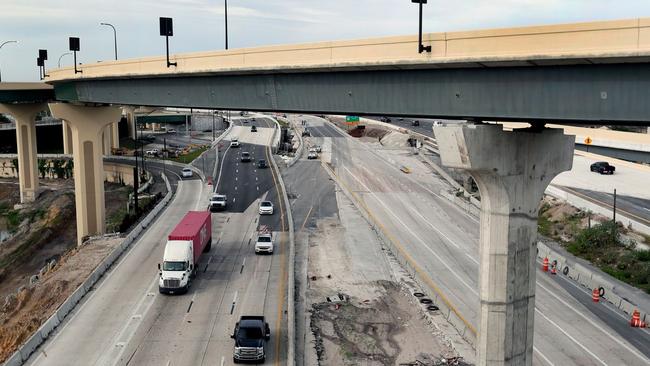US House passes $2.2 trillion infrastructure bill
The US House of Representatives passed a broad effort to rebuild the nation’s roads, railways and schools

The US House of Representatives passed a broad, $US1.5 trillion ($2.2 trillion) effort to rebuild the nation’s roads, railways and schools, as Democrats pursued their own infrastructure legislation without the bipartisan deal discussed for years during the Trump administration.
Almost 40 House Democrats joined with House Republicans to approve a last-minute amendment to the legislation on the floor. The change aims to bar the government from using funds in the bill to enter into contracts with Chinese state-owned companies or Chinese companies that construct facilities for interning Uighurs in China.
The bill pours more than $US300bn into repairing bridges and roads, $US130bn into schools that educate low-income children, more than $US100bn into building or preserving affordable housing and $US100bn into expanding broadband internet access.
Republicans oppose the legislation, which also includes a host of measures aimed at fighting climate change, and the White House has said President Trump would veto it if it came to his desk.
Mr Trump has called for Congress to pass a major infrastructure package since he won the White House in 2016, but the extensive bipartisan negotiations necessary to pass such a bill have repeatedly faltered.
The president has recently sought $US2 trillion in infrastructure spending to help the economy recover from the recession induced by the coronavirus pandemic. Senate Republicans, averse to such a major spending effort, haven’t embraced the administration’s push, and Democrats said they had lost patience hoping for a bipartisan deal that could become law to materialise.
“We have been on the cusp of producing $US1 trillion bill, now it’s a $US2 trillion bill, where is it? Where is it, where’s their alternative?” said Peter DeFazio, a democrat and the chair of the House Infrastructure and Transportation Committee.
In a statement advising the president to veto the bill, the Trump administration criticised the bill for not finding money to pay for the new investments and not including measures accelerating the permitting process for new infrastructure projects.
The House Democratic bill puts roughly $US100bn into new transit funding, investing in putting more buses that don’t release carbon emissions on the road. It would also provide roughly $US65bn in funding for water infrastructure and $US29bn to Amtrak over five years.
While the House Democratic bill is unlikely to become law in the near future, politicians face a September 30 deadline to act before the current five-year highway bill expires. Both the House bill and a separate highway bill in the Senate would provide for five more years of spending on highways and safety programs.
The House bill would spend $US411bn from the Highway Trust Fund, which is fed by taxes on fuel purchases and has faced shortfalls in recent years, while the Senate bill authorises $US287bn over five years. The Senate bill passed unanimously out of committee last year, but, like the House bill, it lacks a plan for providing new revenue.
The federal government hasn’t raised the tax on petrol and diesel since 1993, and revenue to the Highway Trust Fund has dropped as vehicles have become more fuel-efficient. Republicans have opposed raising the tax.
John Barrasso, a republican and chairman of the Senate Environment and Public Works Committee, said funding transportation projects with money from the petrol tax has become more challenging as the pandemic has cut back on travel and fuel purchases. He said reauthorising highway funding could occur in the next economic relief bill.
“If there is another recovery bill, it would be important to include in that bill the things that we were able to do in a bipartisan way in the Senate rather than what they did in a partisan way in the House,” he said.
Congress has approved roughly $US3 trillion in relief funding over the course of four bills this spring, and House Democrats passed a $US3.5 trillion relief bill in May. Senate Republicans haven’t yet committed to approving another relief bill, which they say will consider in earnest beginning in mid-July.



To join the conversation, please log in. Don't have an account? Register
Join the conversation, you are commenting as Logout